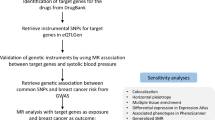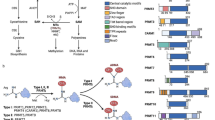Abstract
Tobacco carcinogens metabolism-related genes (TCMGs) could generate reactive metabolites of tobacco carcinogens, which subsequently contributed to multiple diseases. However, the association between genetic variants in TCMGs and bladder cancer susceptibility remains unclear. In this study, we derived TCMGs from metabolic pathways of polycyclic aromatic hydrocarbons and tobacco-specific nitrosamines, and then explored genetic associations between TCMGs and bladder cancer risk in two populations: a Chinese population of 580 cases and 1101 controls, and a European population of 5930 cases and 5468 controls, along with interaction and joint analyses. Expression patterns of TCMGs were sourced from Nanjing Bladder Cancer (NJBC) study and publicly available datasets. Among 43 TCMGs, we observed that rs7087341 T > A in AKR1C2 was associated with a reduced risk of bladder cancer in the Chinese population [odds ratio (OR) = 0.84, 95% confidence interval (CI) = 0.72–0.97, P = 1.86 × 10–2]. Notably, AKR1C2 rs7087341 showed an interaction effect with cigarette smoking on bladder cancer risk (Pinteraction = 5.04 × 10–3), with smokers carrying the T allele increasing the risk up to an OR of 3.96 (Ptrend < 0.001). Genetically, rs7087341 showed an allele-specific transcriptional regulation as located at DNA-sensitive regions of AKR1C2 highlighted by histone markers. Mechanistically, rs7087341 A allele decreased AKR1C2 expression, which was highly expressed in bladder tumors that enhanced metabolism of tobacco carcinogens, and thereby increased DNA adducts and reactive oxygen species formation during bladder tumorigenesis. These findings provided new insights into the genetic mechanisms underlying bladder cancer.




Similar content being viewed by others
Data availability
The data that support the findings of this study is available from the corresponding authors upon reasonable request.
References
Abbass M, Chen Y, Arlt VM, Stürzenbaum SR (2021) Benzo[a]pyrene and Caenorhabditis elegans: defining the genotoxic potential in an organism lacking the classical CYP1A1 pathway. Arch Toxicol 95(3):1055–1069. https://doi.org/10.1007/s00204-020-02968-z
Abu-Bakar A, Tan BH, Halim H, Ramli S, Pan Y, Ong CE (2022) Cytochromes P450: role in carcinogenesis and relevance to cancers. Curr Drug Metab 23(5):355–373. https://doi.org/10.2174/1389200223666220328143828
Anttila S, Raunio H, Hakkola J (2011) Cytochrome P450-mediated pulmonary metabolism of carcinogens: regulation and cross-talk in lung carcinogenesis. Am J Respir Cell Mol Biol 44(5):583–590. https://doi.org/10.1165/rcmb.2010-0189RT
Badal S, Delgoda R (2014) Role of the modulation of CYP1A1 expression and activity in chemoprevention. J Appl Toxicol 34(7):743–753. https://doi.org/10.1002/jat.2968
Berrandou T, Mulot C, Cordina-Duverger E et al (2019) Association of breast cancer risk with polymorphisms in genes involved in the metabolism of xenobiotics and interaction with tobacco smoking: a gene-set analysis. Int J Cancer 144(8):1896–1908. https://doi.org/10.1002/ijc.31917
Bukowska B, Duchnowicz P (2022) Molecular mechanisms of action of selected substances involved in the reduction of Benzo[a]pyrene-induced oxidative stress. Molecules 27(4):1739. https://doi.org/10.3390/molecules27041379
Chiang HC, Huang YK, Chen PF et al (2012) 4-(Methylnitrosamino)-1-(3-pyridyl)-1-butanone is correlated with 8-hydroxy-2’-deoxyguanosine in humans after exposure to environmental tobacco smoke. Sci Total Environ 414:134–139. https://doi.org/10.1016/j.scitotenv.2011.11.039
Chung CJ, Lee HL, Yang HY et al (2011) Low ratio of 4-(methylnitrosamino)-1-(3-pyridyl)-1-butanol-glucuronides (NNAL-Gluc)/free NNAL increases urothelial carcinoma risk. Sci Total Environ 409(9):1638–1642. https://doi.org/10.1016/j.scitotenv.2011.01.046
Cumberbatch MG, Rota M, Catto JW, La Vecchia C (2016) The role of tobacco smoke in bladder and kidney carcinogenesis: a comparison of exposures and meta-analysis of incidence and mortality risks. Eur Urol 70(3):458–466. https://doi.org/10.1016/j.eururo.2015.06.042
Figueroa JD, Ye Y, Siddiq A et al (2014) Genome-wide association study identifies multiple loci associated with bladder cancer risk. Hum Mol Genet 23(5):1387–1398. https://doi.org/10.1093/hmg/ddt519
Franko A, Berti L, Hennenlotter J et al (2020) Transcript levels of aldo-keto reductase family 1 subfamily C (AKR1C) are increased in prostate tissue of patients with type 2 diabetes. J Pers Med 10(3):124. https://doi.org/10.3390/jpm10030124
Freedman ND, Silverman DT, Hollenbeck AR, Schatzkin A, Abnet CC (2011) Association between smoking and risk of bladder cancer among men and women. JAMA 306(7):737–745. https://doi.org/10.1001/jama.2011.1142
Gao F, Li H, Mao Z et al (2022) An integrative approach for identification of smoking-related genes involving bladder cancer. Arch Toxicol. https://doi.org/10.1007/s00204-022-03380-5
Hecht SS (1999) Tobacco smoke carcinogens and lung cancer. J Natl Cancer Inst 91(14):1194–1210. https://doi.org/10.1093/jnci/91.14.1194
Hecht SS (2003) Tobacco carcinogens, their biomarkers and tobacco-induced cancer. Nat Rev Cancer 3(10):733–744. https://doi.org/10.1038/nrc1190
Ho T, Wei Q, Sturgis EM (2007) Epidemiology of carcinogen metabolism genes and risk of squamous cell carcinoma of the head and neck. Head Neck 29(7):682–699. https://doi.org/10.1002/hed.20570
Hreljac I, Filipic M (2009) Organophosphorus pesticides enhance the genotoxicity of benzo(a)pyrene by modulating its metabolism. Mutat Res 671(1–2):84–92. https://doi.org/10.1016/j.mrfmmm.2009.09.011
Huang Z, Sun S, Lee M et al (2022) Single-cell analysis of somatic mutations in human bronchial epithelial cells in relation to aging and smoking. Nat Genet 54(4):492–498. https://doi.org/10.1038/s41588-022-01035-w
Jin F, Thaiparambil J, Donepudi SR et al (2017) Tobacco-specific carcinogens induce hypermethylation, DNA adducts, and DNA damage in bladder cancer. Cancer Prev Res 10(10):588–597. https://doi.org/10.1158/1940-6207.Capr-17-0198
Jubber I, Ong S, Bukavina L et al (2023) Epidemiology of bladder cancer in 2023: a systematic review of risk factors. Eur Urol 84(2):176–190. https://doi.org/10.1016/j.eururo.2023.03.029
Koutros S, Kiemeney LA, Pal Choudhury P et al (2023) Genome-wide association study of bladder cancer reveals new biological and translational insights. Eur Urol 84(1):127–137. https://doi.org/10.1016/j.eururo.2023.04.020
Kwan ML, Haque R, Young-Wolff KC et al (2022) Smoking behaviors and prognosis in patients with non-muscle-invasive bladder cancer in the be-well study. JAMA Netw Open 5(11):e2244430. https://doi.org/10.1001/jamanetworkopen.2022.44430
Lenis AT, Lec PM, Chamie K, Mshs MD (2020) Bladder cancer: a review. JAMA 324(19):1980–1991. https://doi.org/10.1001/jama.2020.17598
Li K, Chen Y (2020) CYP2C8 regulated by GAS5/miR-382-3p exerts anti-cancerous properties in liver cancer. Cancer Biol Ther 21(12):1145–1153. https://doi.org/10.1080/15384047.2020.1840886
Liang F, Wang GZ, Wang Y et al (2022) Tobacco carcinogen induces tryptophan metabolism and immune suppression via induction of indoleamine 2,3-dioxygenase 1. Signal Transduct Target Ther 7(1):311. https://doi.org/10.1038/s41392-022-01127-3
Lipunova N, Wesselius A, Cheng KK et al (2020) Gene-environment interaction with smoking for increased non-muscle-invasive bladder cancer tumor size. Transl Androl Urol 9(3):1329–1337. https://doi.org/10.21037/tau-19-523
Liu L, Wu G, Xue F et al (2013) Functional CYP1A1 genetic variants, alone and in combination with smoking, contribute to development of head and neck cancers. Eur J Cancer 49(9):2143–2151. https://doi.org/10.1016/j.ejca.2013.01.028
Liu H, Li G, Sturgis EM et al (2022) Genetic variants in CYP2B6 and HSD17B12 associated with risk of squamous cell carcinoma of the head and neck. Int J Cancer 151(4):553–564. https://doi.org/10.1002/ijc.34023
Ma L, Zhang D, Huang Z et al (2022) Functional variants of RPS6KB1 and PIK3R1 in the autophagy pathway genes and risk of bladder cancer. Arch Toxicol 96(1):367–375. https://doi.org/10.1007/s00204-021-03173-2
Mailman MD, Feolo M, Jin Y et al (2007) The NCBI dbGaP database of genotypes and phenotypes. Nat Genet 39(10):1181–1186. https://doi.org/10.1038/ng1007-1181
Marinović MA, Petri ET, Grbović LM et al (2022) Investigation of the potential of bile acid methyl esters as inhibitors of aldo-keto reductase 1C2: insight from molecular docking, virtual screening, experimental assays and molecular dynamics. Mol Inform. 41:e2100256. https://doi.org/10.1002/minf.202100256
Modesto JL, Hull A, Angstadt AY et al (2015) NNK reduction pathway gene polymorphisms and risk of lung cancer. Mol Carcinog. https://doi.org/10.1002/mc.22187
Moloney JN, Cotter TG (2018) ROS signalling in the biology of cancer. Semin Cell Dev Biol 80:50–64. https://doi.org/10.1016/j.semcdb.2017.05.023
Nazarian A, Arbeev KG, Yashkin AP, Kulminski AM (2022) Genome-wide analysis of genetic predisposition to common polygenic cancers. J Appl Genet 63(2):315–325. https://doi.org/10.1007/s13353-021-00679-4
Sabharwal SS, Schumacker PT (2014) Mitochondrial ROS in cancer: initiators, amplifiers or an Achilles’ heel? Nat Rev Cancer 14(11):709–721. https://doi.org/10.1038/nrc3803
Shimada T (2006) Xenobiotic-metabolizing enzymes involved in activation and detoxification of carcinogenic polycyclic aromatic hydrocarbons. Drug Metab Pharmacokinet 21(4):257–276. https://doi.org/10.2133/dmpk.21.257
Shultz CA, Quinn AM, Park JH et al (2011) Specificity of human aldo-keto reductases, NAD(P)H:quinone oxidoreductase, and carbonyl reductases to redox-cycle polycyclic aromatic hydrocarbon diones and 4-hydroxyequilenin-o-quinone. Chem Res Toxicol 24(12):2153–2166. https://doi.org/10.1021/tx200294c
Siegel RL, Miller KD, Wagle NS, Jemal A (2023) Cancer statistics. CA Cancer J Clin 73(1):17–48. https://doi.org/10.3322/caac.21763
Sun Y, Wang H, Chen H et al (2022) Nicotine inhibits the cytotoxicity and genotoxicity of NNK mediated by CYP2A13 in BEAS-2B cells. Molecules 27(15):4851. https://doi.org/10.3390/molecules27154851
Szatrowski TP, Nathan CF (1991) Production of large amounts of hydrogen peroxide by human tumor cells. Cancer Res 51(3):794–798
Wojtczyk-Miaskowska A, Schlichtholz B (2019) Tobacco carcinogens and the methionine metabolism in human bladder cancer. Mutat Res, Rev Mutat Res 782:108281. https://doi.org/10.1016/j.mrrev.2019.06.001
Yershova K, Yuan JM, Wang R et al (2016) Tobacco-specific N-nitrosamines and polycyclic aromatic hydrocarbons in cigarettes smoked by the participants of the Shanghai Cohort Study. Int J Cancer 139(6):1261–1269. https://doi.org/10.1002/ijc.30178
Yuan JM, Nelson HH, Butler LM et al (2016) Genetic determinants of cytochrome P450 2A6 activity and biomarkers of tobacco smoke exposure in relation to risk of lung cancer development in the Shanghai cohort study. Int J Cancer 138(9):2161–2171. https://doi.org/10.1002/ijc.29963
Yun BH, Xiao S, Yao L et al (2017) A Rapid throughput method to extract DNA from formalin-fixed paraffin-embedded tissues for biomonitoring carcinogenic DNA adducts. Chem Res Toxicol 30(12):2130–2139. https://doi.org/10.1021/acs.chemrestox.7b00218
Zhang ZF, Huang TJ, Zhang XK et al (2020) AKR1C2 acts as a targetable oncogene in esophageal squamous cell carcinoma via activating PI3K/AKT signaling pathway. J Cell Mol Med 24(17):9999–10012. https://doi.org/10.1111/jcmm.15604
Zheng R, Du M, Ge Y et al (2021) Identification of low-frequency variants of UGT1A3 associated with bladder cancer risk by next-generation sequencing. Oncogene 40(13):2382–2394. https://doi.org/10.1038/s41388-021-01672-1
Zheng R, Zhang S, Zeng H et al (2022) Cancer incidence and mortality in China, 2016. J Natl Cancer Center 2(1):1–9. https://doi.org/10.1016/j.jncc.2022.02.002
Zheng R, Gao F, Mao Z et al (2023) LncRNA BCCE4 genetically enhances the PD-L1/PD-1 interaction in smoking-related bladder cancer by modulating miR-328–3p-USP18 signaling. Adv Sci 10:e2303473. https://doi.org/10.1002/advs.202303473
Acknowledgements
This work was supported by the National Natural Science Foundation of China (Grant Numbers: 82130096 and 82103878) and the Priority Academic Program Development of Jiangsu Higher Education Institutions (Public Health and Preventive Medicine). We are grateful to all the people who helped us accomplish this project.
Author information
Authors and Affiliations
Contributions
Z.Z., R.Z., and M.D. conceived and designed the study. Y.X., Y.S., Z.M., F.G., and H.S. recruited study subjects. Y.X, Y.S., and H.S. performed statistical analyses and summarized results. H.C., D.W., and M.W. contributed reagents/materials/analysis tools. Y.X, Y.S., and H.S. wrote the paper. Z.Z., R.Z., and M.D. revised the paper, and all authors commented on previous versions of the manuscript. All authors read and approved the final manuscript.
Corresponding authors
Ethics declarations
Conflict of interest
The authors declare that they have no competing interests.
Additional information
Publisher's Note
Springer Nature remains neutral with regard to jurisdictional claims in published maps and institutional affiliations.
Supplementary Information
Below is the link to the electronic supplementary material.
Rights and permissions
Springer Nature or its licensor (e.g. a society or other partner) holds exclusive rights to this article under a publishing agreement with the author(s) or other rightsholder(s); author self-archiving of the accepted manuscript version of this article is solely governed by the terms of such publishing agreement and applicable law.
About this article
Cite this article
Xiao, Y., Shen, Y., Song, H. et al. AKR1C2 genetic variants mediate tobacco carcinogens metabolism involving bladder cancer susceptibility. Arch Toxicol (2024). https://doi.org/10.1007/s00204-024-03737-y
Received:
Accepted:
Published:
DOI: https://doi.org/10.1007/s00204-024-03737-y




